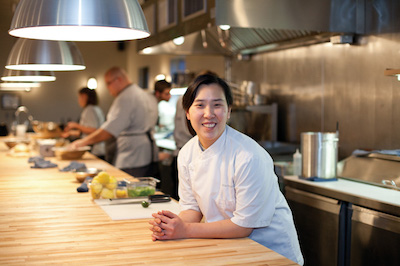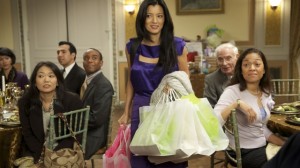The Language of Food
Chef Rachel Yang never quite felt comfortable in the U.S. But then she started cooking.
by Eugene Yi
Rachel Yang grew up a parachute kid, her parents uprooting her at age 15 from Korea to New York.
“It was really tough. I don’t think I’ll ever send my kids away when she’s a teenager,” she said in her accented but rapid English, a pace learned from years spent barking in kitchens. “There’s a lot more that you can learn at that age, better than trying to learn an entirely different culture and language.”
Still, at the turn of the century, she found herself with a degree from Brown University and a bright future ahead of her. The experiment in long-distance parenting appeared to have been successful. But she wasn’t sure what to do next, so she took a cooking class on a whim.
“It was like discovering a third language, a universal language everyone speaks,” she said.
She quickly found work with some of the superstars of French cuisine in New York City: Alain Ducasse, Thomas Keller, Daniel Boulud. After a few years, she got the chance to head a kitchen serving a modern take on Korean cuisine.
“That’s kind of where I got reintroduced to Korean food,” she said. “It was something I was eating almost every night at home, but never was something I thought I’d cook.” The experimentation with Korean flavors had begun.
[ad#graphic-square]
Yang soon moved to Seattle, the hometown of her husband and fellow chef Seif Chirchi. The couple opened a restaurant called Joule that incorporated subtle Korean influences into French-inflected fare.
Fusion cuisine is something people are rightfully “a little scared of,” she said. The trick is to not try to create something vastly different.
“One of the really popular dishes at Joule is a smoked tofu with mushroom confit and truffle vinaigrette,” she said. “The smokiness of tofu, the earthiness of truffle, and the musky mushroom have a very oozy flavor. They are on the same notes.”
If anything, a greater challenge might have been anglicizing Korean ingredients for the menu.
“I’ve exchanged emails back and forth with people who specialize in English spellings, but they go back and forth about whether to put two d’s or two t’s for tteok,” she said. “The funny thing was that we had it on the menu as rice cake, and people thought of it as crunchy rice cakes. And that’s how it ended up as Korean mochi on our menu. I’m not happy with that one.”
Linguistic difficulties aside, business has been great for Yang and her husband. Joule has been nominated for the prestigious James Beard award several times. In December of 2010, the husband and wife team opened a second restaurant in Seattle called Revel. Yang and Chirchi have even been on Iron Chef America.
The South Korean government invited her to perform a cooking demonstration at the Seoul International Tteok Festival, a rare opportunity for a homecoming and a chance to show off her success to her parents.
“It was nice to tell them after only a few years of cooking that I kind of proved to myself that it doesn’t matter that I’m not a lawyer or a doctor,” said Yang. “I’m here, and I’m doing something and getting recognized for it.”
This story was brought to you by ![]()
This article was published in the October 2011 issue of KoreAm. Subscribe today!






